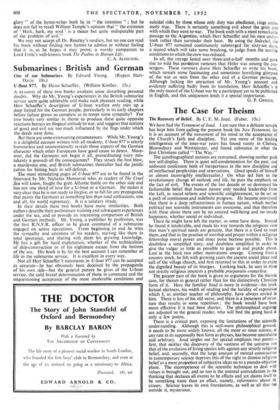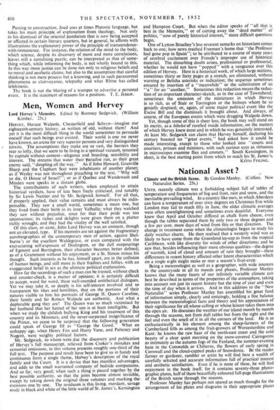The Case for Theism •
The Recovery of Belief. By C. E. M. Joad. (Faber. 15s.) WE have had the Testament of Joad. I am sure that a delicate scruple has kept him from calling the present book his New Testament, for it is an account of thb movement of his mind to the acceptance of the Church's faith and discipline. Yet one more of the leading intelligentsia of the inter-war years has found vanity in Chelsea, Bloomsbury and Westminster, and found substance in what the first Christians called " The Way."
The autobiographical sections are restrained, showing neither gush nor self-display. There is quiet self-condemnation for the past, and unforced confession both of inexpertness in the new discipline and of intellectual perplexities and reservations. (Joad speaks of himself as almost incorrigibly intellectualist.) On what led him to the revolutionary change of outlook and life, he puts the emphasis on the fact of evil. The ,events of the last decade or so destroyed, his fashionable belief that human nature only needed leadership from the Left, in social reform and scientific enlightenment, to be set on a path of continuous and indefinite progress. He became convinced that there is a deep refractoriness in human nature, which neither political nor scientific instruments can overcome, and that therefore with these alone there can be no assured well-being and no steady happiness, whether social or individual.
There he might have left the matter, as some have done. Instead he found it intolerable, and made his way towards the religious view that man's spiritual needs are genuine, that there is a God to meet them, and that in the practice of worship and prayer within a religious fellowship moral power and inner poise become possible. This is doubtless a simplified story, and doubtless simplified in order to give the vulgar as little as possible to gape at and prattle about. Late in the book two other motivations emerge. Coming from a country stock, he felt with growing years the ancient social place and call of the village church, and first returned to this in order to enjoy the dignified beauty of its liturgies. Looking back, he sees in these not strictly religious interests a probable praeparatio evangelica. The greater part of the book is given to arguments for the theistic case, for theism in general rather than for the distinctively Christian form of it. Here the familiar Joad is more in evidence—his intel- lectual alertness, his width of reading and the lucidity of exposition which I, as another teacher of philosophy, have always envied in him. There is less of his old verve, and there is a loosenesS of strut ture that results in some repetition ; the book would have been more effective if it had been shorter. The philosophical arguing are adjusted to the general reader, who will find the going hard at only a few points. There is a critical part, exposing the limitations of the scientific understanding. Although this is well-worn philosophical ground, it needs to be more widely known, all the more so since science, at any rate in its supposedly best form as physics, has become speculative and arbitrary. Joad singles out for special emphasis two points— first, that neither the discovery of the vastness of the universe not that of the evolution of living species tells against any strictly religious belief, and, secondly, that the large amount of mental construction in contemporary science deprives this of the right to dismiss religious belief as a mere projection, of subjective ideas on to a pseudo-objective plane. The incompetence of the scientific technique to deal with values is brought out, and so too is the internal contradiction in the thinking that declares all events to be effects and yet claims itself to be something more than an effect, namely, informative about its causes. Science leaves its own foundations, as well as all that lies outside it, mysterious. Passing to construction, Joad uses at times Platonic language, but takes his main principle of explanation from theology. Not only in his dismissal of the oriental pantheism that is now being accepted or affected in certain literary quarters, but in general, he affirms with illustrations the explanatory power of the principle of transcendence- with-immanence. For instance, the relation of the mind to the body, which science, despite its discovery of more and more correlations, leaves still a tantalising puzzle, can be interpreted as that of some- thing which, while informing the body, is not wholly bound to this. In this way more justice can be done not only to religious beliefs and to moral and aesthetic claims, but also to the assumption that careful thinking is not mere process but a knowing, and to such paranormal phenomena as clairvoyance, telepathy and what Rhine has called telekinesis.
The book is not the blaring of a trumpet to advertise a personal event. It is the statement of reasons for a position. T. E. JESSOP.



































 Previous page
Previous page